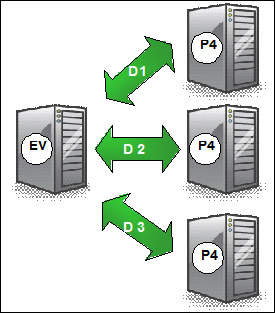Multiple Perforce Servers
To integrate with multiple Perforce servers, you configure multiple daemons, each with its own properties file, and each pointing to a different Perforce repository. There is nothing special required, the same ExtraView user may be used within each properties file, or different users may be used.

Configuring multiple Perforce servers
The key to successfully using multiple Perforce servers is to configure the p4.properties files such that they will independently fire the triggers, based upon your needs. For example, you may have your Perforce servers configured around products, such that one set of products reside within one server, another set of products within the next server, etc. As explained in the last section, the following entries control which issues ExtraView communicates to the Perforce server:
MI_FIELD = <ExtraView field>
MI_REGEX = <regular expression>
MI_POLL_TRIGGER = <boolean/arithmetic expression>
You should set these entries in each of the different p4.properties files to be mutually exclusive, i.e. only one daemon will respond to one set of triggers. In our example, the field upon which you will trigger will be the product_name field within ExtraView with an entry similar to:
MI_POLL_TRIGGER = __product_name__ eq MyProduct
Of course, MyProduct is the title to the product selected for that daemon and other daemons will be configured with the titles of other products. The daemons may all be configured on one server, or configured on separate servers. The entries within the p4.properties file on each daemon simply point to the appropriate Perforce and ExtraView servers.
